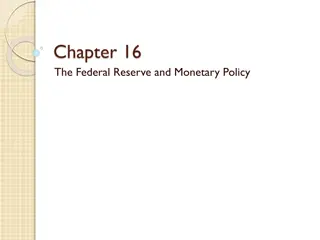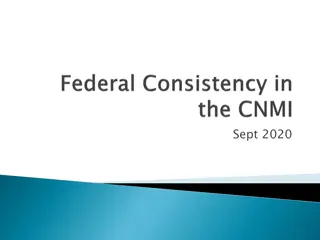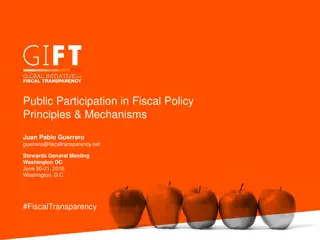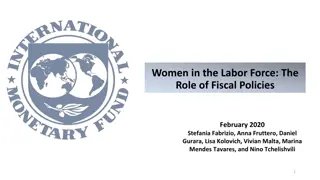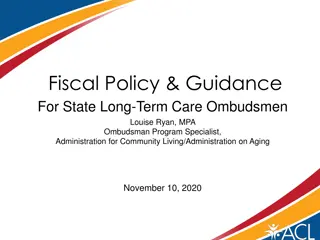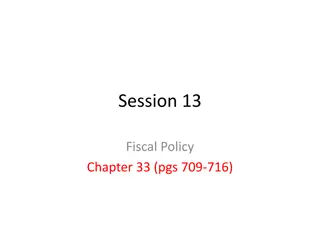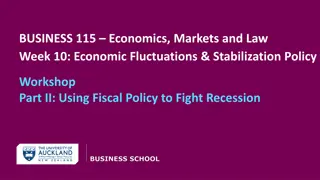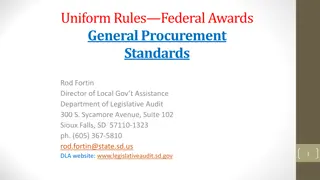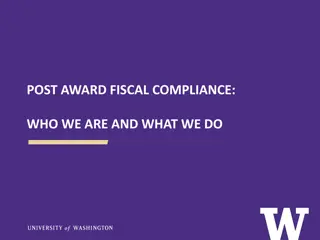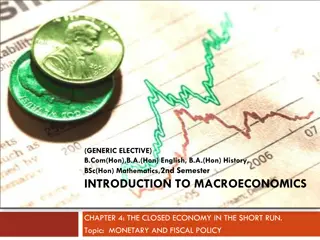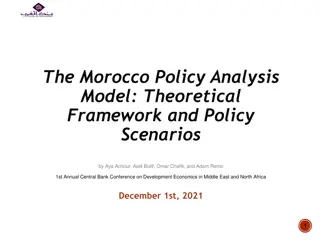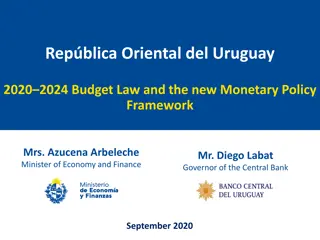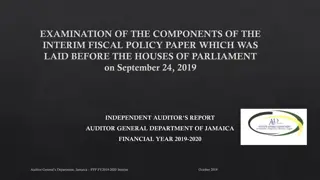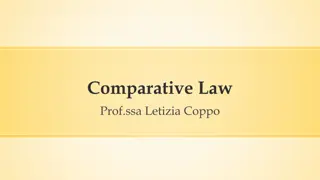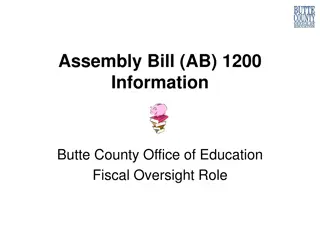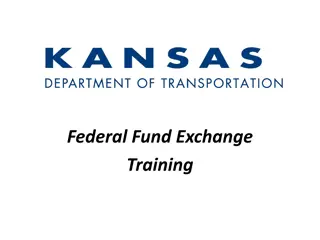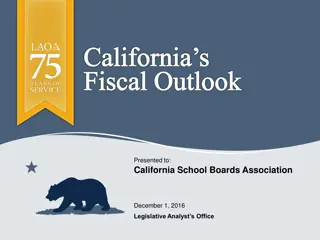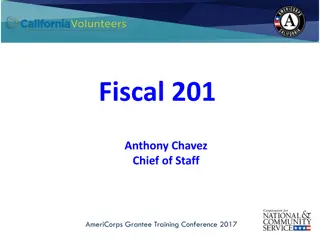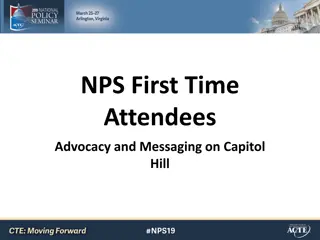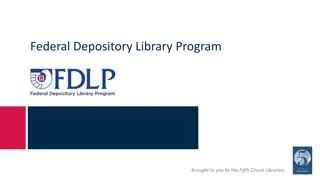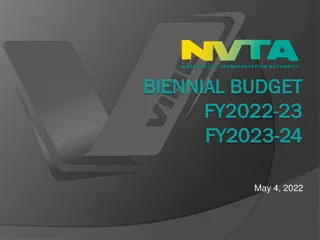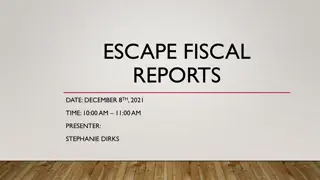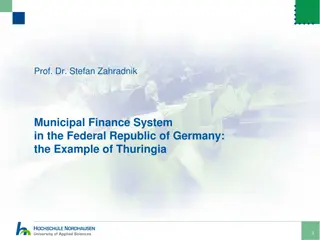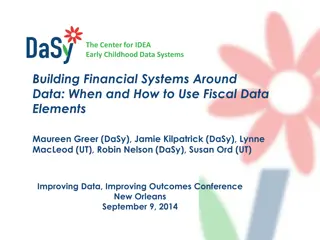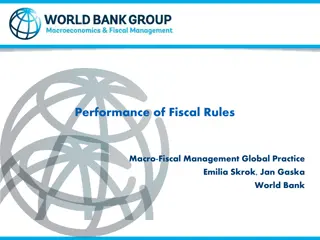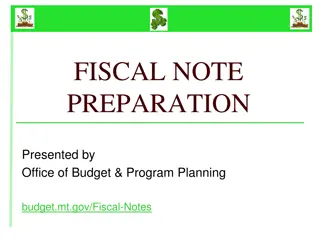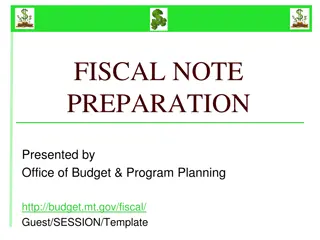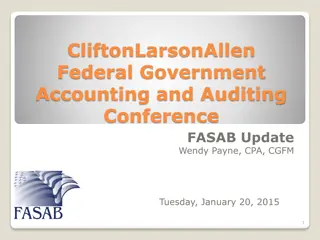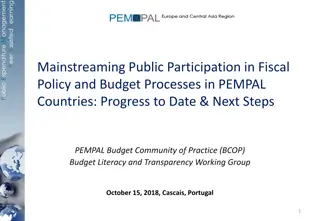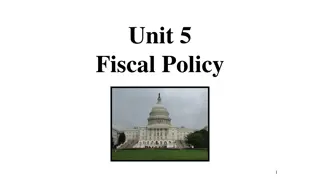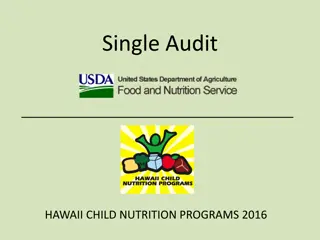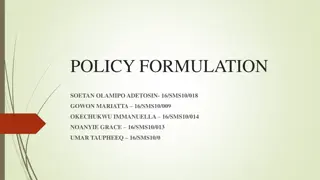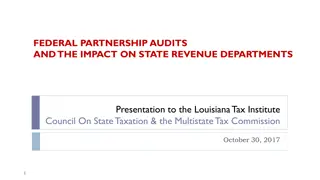Relevance of Countercyclical Fiscal Policy and Fiscal Acyclicality
This literature review examines the effectiveness of countercyclical fiscal policies in stabilizing output and enhancing welfare, with a focus on the correlation between public spending cycles and GDP cycles. The study analyzes examples from Sweden and Argentina to showcase the impact of fiscal poli
2 views • 29 slides
Understanding the Federal Reserve System and Monetary Policy
Delve into the history, structure, and functions of the Federal Reserve System, including its role in implementing monetary policy to stabilize the economy. Explore the establishment of the Federal Reserve Act of 1913, the structure of the Federal Reserve, and its pivotal role in serving the governm
0 views • 35 slides
Understanding Federal Consistency in Coastal Zone Management
This presentation serves as an introduction to Federal Consistency in the context of Coastal Zone Management, emphasizing the importance of compliance with enforceable policies outlined in the Coastal Zone Management Act. It highlights the role of the Division of Coastal Resources Management (DCRM)
1 views • 13 slides
Principles of Public Participation in Fiscal Policy
The work by GIFT focuses on developing principles for public participation in fiscal policy, emphasizing the importance of citizen engagement beyond mere disclosure. These principles aim to enhance accountability, uphold citizens' rights, and improve policy quality through inclusiveness and openness
0 views • 17 slides
Gender-Responsive Fiscal Policies and Female Labor Force Participation
Despite persistent gender gaps in labor force participation and wages, various fiscal policy measures have been adopted globally since the mid-1980s to address these disparities. Understanding the impact of gender-responsive fiscal policies on female labor force participation, economic growth, incom
0 views • 23 slides
Enhancing Fiscal Policy Planning through Public Participation and Transparency
Explore the importance of public participation and meaningful transparency in fiscal policy planning and public expenditure management. Learn about the GIFT Network, its champions and stewards, and how fiscal transparency and public participation can lead to improved fiscal and development outcomes
0 views • 22 slides
Fiscal Policy Guidance for State Long-Term Care Ombudsmen
Overview of the fiscal management responsibilities for State Long-Term Care Ombudsmen under the Older Americans Act requirements. Covers topics such as fiscal management, funding allocations, state plan requirements, and fiscal responsibilities. Details the OAA and LTCOP rule provisions related to f
6 views • 22 slides
Understanding Fiscal Policy: A Comprehensive Overview
Fiscal policy involves changes in government spending and taxes to influence macroeconomic objectives like employment, price stability, and economic growth. It includes expansionary and contractionary policies to manage aggregate demand and stabilize the economy. This overview covers types of fiscal
0 views • 24 slides
Understanding Fiscal Policy to Combat Recessions
Explore the role of fiscal policy in fighting recessions through stimulating aggregate demand, using government spending and tax cuts. Learn about the Keynesian multiplier effect, MPC, and different policy responses to economic fluctuations. Discover how government interventions can help stabilize t
0 views • 47 slides
Understanding Federal Awards Procurement Standards
Explore the Uniform Rules-Federal Awards Procurement Standards under 2 C.F.R., addressing common federal findings, state versus non-federal entities, and state compliance requirements. The information provided delves into the purpose of procurement standards and the importance of adhering to federal
1 views • 48 slides
Principles of Fiscal Deficits and Debt Management According to Kalecki
Economist Kalecki advocated for a permanent regime of fiscal deficits to manage public debt, emphasizing the importance of debt management for liquidity in the financial system. His principles involve splitting the government budget into functional and financial parts, each influencing aggregate dem
0 views • 6 slides
Post Award Fiscal Compliance: Who We Are and What We Do
Post Award Fiscal Compliance (PAFC) assists campus and central administrative units in mitigating non-compliance risks with sponsor terms and conditions by monitoring compliance, interpreting award requirements, providing training, and enhancing internal controls. The team includes Matt Gardner, Ass
0 views • 11 slides
Macroeconomic Policy Tools: Monetary and Fiscal Policy in Short Run
This chapter delves into the IS-LM model to illustrate the functioning of monetary and fiscal policies in influencing economic growth. It explains how these policies impact output, interest rates, and inflation rates in a closed economy in the short run. Monetary policy mainly operates through open
0 views • 18 slides
Analysis of the Moroccan Policy Analysis Model for Economic Development
The Morocco Policy Analysis Model (MOPAM) is a large-scale annual model that incorporates fiscal and monetary policies, inspired by the IMF's FSGM model. It examines the impact of a flexible exchange rate regime and various fiscal policy stances on economic fundamentals. MOPAM features DSGE and OLG-
0 views • 15 slides
Economic Recovery and Fiscal Stability in Uruguay: Budget Law and Monetary Policy Framework 2020-2024
The Budget Law and Monetary Policy Framework in Uruguay for 2020-2024 focus on restoring fiscal consolidation, stabilizing debt, and implementing market-friendly policies for economic recovery. Successful COVID-19 containment strategies have allowed for a faster normalization of economic activity. L
2 views • 35 slides
Examination of Interim Fiscal Policy Paper for Financial Year 2019-2020
An independent auditor's report on the interim fiscal policy paper laid before the Houses of Parliament, confirming compliance with the requirements of the FAA Act. The report assesses the components, conventions, and assumptions underlying the paper for fiscal responsibility, macroeconomic framewor
1 views • 15 slides
Understanding the Federal System in American Law
The American legal system is rooted in a division of powers between the States and the Federal government. Federal law fills gaps and complements State laws, with Federal courts having jurisdiction over disputes involving different States or Federal issues. The Constitution and Bill of Rights protec
0 views • 23 slides
Butte County Office of Education Fiscal Oversight Role Overview
The Assembly Bill (AB) 1200 provides insights into the fiscal oversight role of Butte County Office of Education (BCOE). It outlines the responsibilities of local boards of education, BCOE as an intermediary agent, and the creation of the Financial Crises and Management Assistance Team (FCMAT) in 19
0 views • 12 slides
Understanding Federal Fund Exchange Training Program
The Federal Fund Exchange program allows Local Public Agencies to exchange federal obligation authority for state funds, reducing time-consuming federal-aid project requirements. Benefits include flexibility in project selection, wider scopes, and avoiding restrictive federal provisions. Eligible pr
0 views • 27 slides
California's Fiscal Outlook Presentation to California School Boards Association
California's fiscal outlook was presented to the California School Boards Association by the Legislative Analyst's Office in December 2016. The report highlights a decrease in revenues and expenditures for the 2016-17 fiscal year, leading to a revised reserve down by $1 billion. However, the state i
0 views • 22 slides
AmeriCorps California Volunteers Fiscal Training Conference 2017 Details
In July 2017, the AmeriCorps Grantee Training Conference took place, focusing on fiscal procedures, compliance, desk reviews, and monitoring. The conference covered topics such as improper payments elimination, common audit findings, and the fiscal desk review process implemented by California Volun
2 views • 22 slides
Advocacy and Messaging Strategies in Federal Education Policy
Exploring the importance of advocacy and lobbying in federal education policy, this content covers topics such as the legislative process, notable CTE priorities, federal funding authorization, and appropriations. It highlights the role of federal advocacy in shaping education policies, influencing
0 views • 29 slides
NARFE Membership: Protecting Federal Benefits & Enhancing Retirement Security
NARFE, the association for federal employees and retirees, is dedicated to safeguarding federal workers' benefits and providing valuable resources for maximizing their retirement savings. Through advocacy and informational resources, NARFE helps federal employees navigate changes in federal policies
0 views • 11 slides
Federal Depository Library Program: Providing Access to Government Information
The Federal Depository Library Program (FDLP) offers free government materials to libraries, ensuring public access to federal information. Established in 1813, the program disseminates resources across 1150 federal libraries, promoting transparency and accountability. Selective depository libraries
0 views • 20 slides
Fiscal Year 2023 Budget Overview
The content presents detailed information on the fiscal year 2023 budget, including budget cycles, comparisons between fiscal years, source of funds, expenditure plans, and top projects for the Consolidated Municipal Agency (CMA). It covers budget development processes, funding sources, expenditure
0 views • 11 slides
Emerging Markets Investors Alliance and GIFT: Promoting Fiscal Transparency
The Emerging Markets Investors Alliance, in partnership with GIFT (Global Initiative for Fiscal Transparency), aims to educate institutional investors about fiscal transparency and facilitate investor advocacy with governments. Through roundtable discussions and engagements with finance ministers, t
0 views • 5 slides
Understanding Fiscal Reports and Budgeting Process
Dive into the world of fiscal reports and budgeting with a presentation led by Stephanie Dirks. Explore the Budget Code Story, different types of reports, and examples of Fiscal 04 & Fiscal 06 reports. Learn about Fund allocations, Object Codes, and responsible oversight of funds. Get insights into
0 views • 17 slides
Municipal Finance System in the Federal Republic of Germany: Thuringia Example
The presentation outlines the municipal finance system in the Federal Republic of Germany, using Thuringia as an example. It covers tax revenue, key allocations to municipalities, fiscal equalization, and the structure of the federal and state governments. Various taxes, including federal, municipal
0 views • 12 slides
Building Financial Systems Around Fiscal Data in Early Childhood Programs
Understand the importance of fiscal data in program management, identify key fiscal data elements, address policy questions, and learn from a state's cost study design. Explore the significance of fiscal data for decision-making, policy development, and program management, with a focus on revenue so
0 views • 31 slides
Global Practices in Fiscal Rule Performance
The study explores the implementation and impact of fiscal rules on macro-fiscal management, focusing on international experiences. It discusses the presence and compliance with fiscal rules, highlighting differences in pro-cyclicality among small and large countries. The rise in adoption of nationa
0 views • 23 slides
Understanding Fiscal Notes in Government Legislation
Fiscal notes are essential documents accompanying bills affecting finances of state entities. They detail revenue, expenditure, and fiscal impact, requiring a 6-day processing timeline. The need for a fiscal note may be determined by legislative services, committees, sponsors, or agencies. The proce
1 views • 30 slides
Fiscal Note Preparation Process and Guidelines
Fiscal notes are essential for bills affecting state finances. This includes the total processing time, exceptions, and what to do if there is disagreement on the fiscal note. The process involves multiple steps, including drafting, review, and resolution of disagreements. The President of the Senat
0 views • 29 slides
Federal Government Accounting and Auditing Conference Update
CliftonLarsonAllen presents the Federal Government Accounting and Auditing Conference update, discussing topics such as fiscal sustainability, fiscal projections, social insurance, and standards-setting over the past 25 years. The event highlights important projects related to risk, assumed leases,
0 views • 31 slides
Morality in UK Drug Policy: Policy Constellations Analysis
Morality plays a significant role in shaping drug policy in the UK, as revealed by the research conducted by Professor Alex Stevens at the University of Kent. The study investigates the moral commitments underlying different policy positions in UK drug policy debates, highlighting five ethico-politi
0 views • 19 slides
Travel Policy Changes at Pittsburg State University
Pittsburg State University is implementing new travel policy changes effective January 1, 2016, aligning with federal standards for per diem rates. The changes are a result of the State of Kansas adopting federal rates and will impact all travel occurring after the specified date. The policy update
0 views • 21 slides
Enhancing Public Participation in Fiscal Policy and Budget Processes in PEMPAL Countries
This document discusses the progress and next steps in mainstreaming public participation in fiscal policy and budget processes in PEMPAL countries. It covers definitions of public participation and budget literacy, outlines international frameworks, presents survey findings on public participation,
0 views • 35 slides
Understanding Government Tools for Economic Stability
The government uses fiscal and monetary policies to stabilize the economy. Fiscal policy involves Congress's actions through government spending or taxation changes, while monetary policy is driven by the Federal Reserve Bank. Discretionary fiscal policy involves new bills designed to adjust aggrega
0 views • 36 slides
Understanding Single Audit Requirements for Hawaii Child Nutrition Programs 2016
In accordance with federal regulations, non-Federal entities that expend $750,000 or more in Federal funds, including USDA's child nutrition programs, are required to undergo a Single Audit. The audit must be completed within nine months of the organization's fiscal year-end, and the final report mu
0 views • 5 slides
Understanding Policy Formulation: Key Concepts and Approaches
Policy formulation is a crucial step in the policy-making process, involving identifying and crafting policy alternatives to address various issues. This phase requires participants to define policy problems, develop alternatives, and select the most feasible solutions based on criteria such as feas
1 views • 12 slides
Understanding Federal Partnership Audits and Their Impact on State Revenue Departments
The presentation discusses the impact of federal partnership audits on state revenue departments, emphasizing how states benefit from federal audit efforts. It covers topics such as reporting federal audit adjustments, the background of federal audit adjustments, and the final determination process.
0 views • 51 slides

